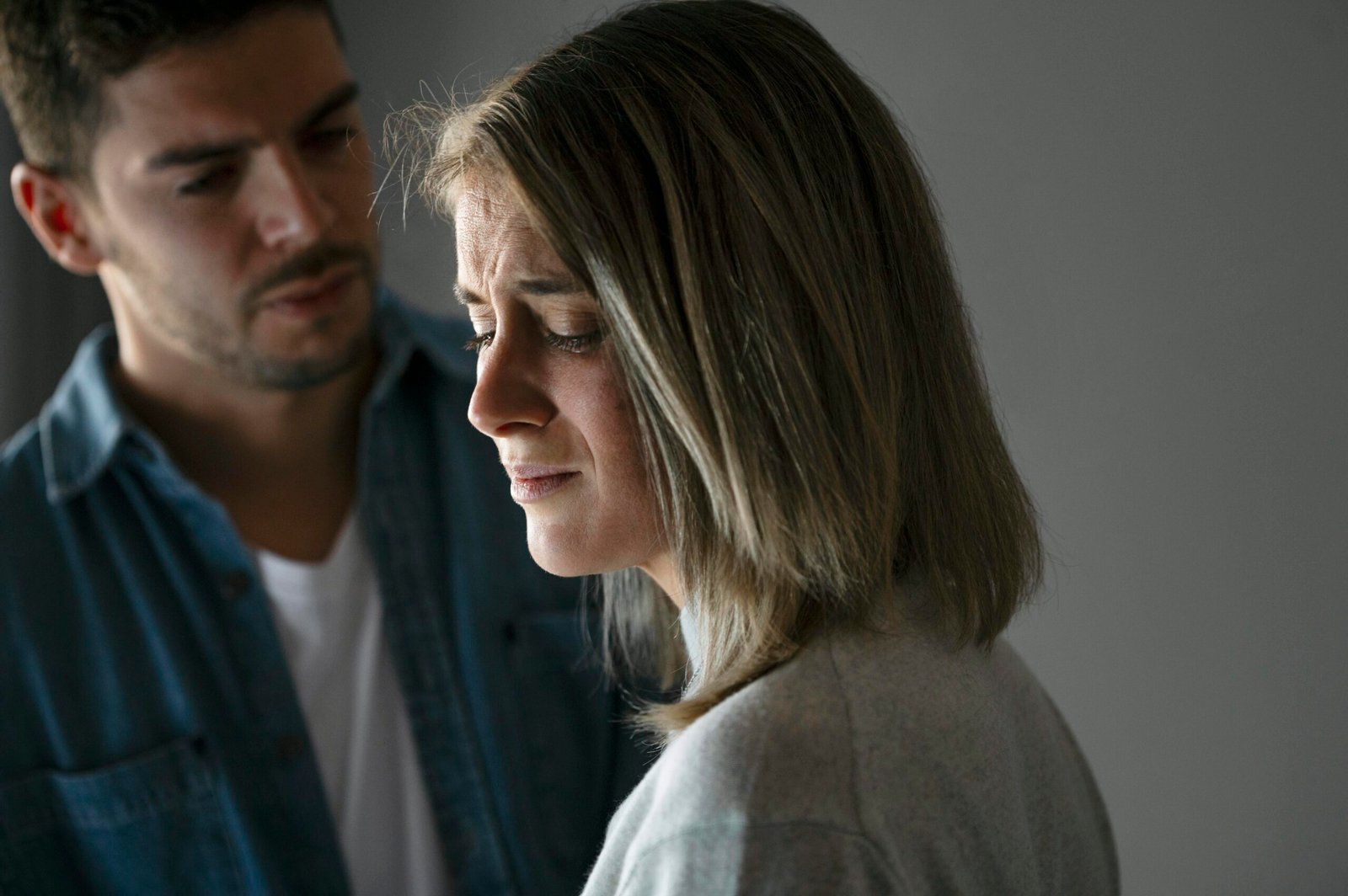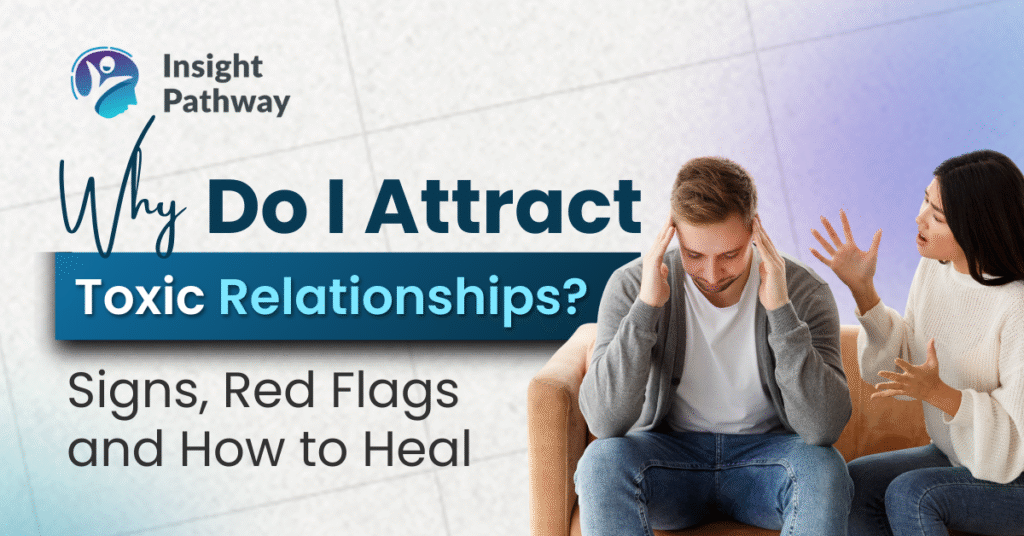Have you ever wondered why you continue to be drawn to toxic relationships? You’re not alone. Many people unknowingly fall into unhealthy patterns that keep drawing in the same kind of emotionally harmful partners. This pattern frequently results in relational trauma, undermines self-worth, and makes it more difficult to discern what constitutes genuinely healthy love.
In this post, we’ll explore why toxic relationships happen, the signs and red flags in relationships, and, most importantly, how to heal from toxic relationships so you can create safer, more fulfilling connections.
Understanding Toxic Relationships: What Makes Them Harmful
A toxic relationship is one that consistently drains your emotional energy and damages your mental health. These relationships can be romantic, but they also show up in friendships, family, and even work environments.
While every relationship has challenges, toxic ones are marked by a consistent pattern of:
- Control or manipulation
- Emotional abuse
- Guilt-tripping and gaslighting
- Lack of empathy or respect
- Fear of speaking up
Over time, these experiences lead to relationship trauma, which can affect your self-worth, decision-making, and trust in others.

Why You Might Be Attracting Toxic Relationships
You’re not choosing to be hurt, but you may be repeating subconscious patterns rooted in early emotional experiences. To end the loop, you must first understand why.
Low Self-Worth and the Need for Validation
People who struggle with low self-esteem may tolerate poor treatment in exchange for attention or affection. This dynamic often mirrors early childhood conditioning where love was conditional.
Unresolved Childhood Trauma
If you grew up around emotional neglect, criticism, or unpredictability, those patterns may feel familiar and even comforting leading you to unconsciously seek them out in adulthood.
Codependency and People-Pleasing
Codependent tendencies, such as prioritizing others’ needs while ignoring your own, make it easier for toxic dynamics to flourish.
Fear of Abandonment
The agony of a poisonous relationship may not always be as great as the terror of being alone. This fear often leads to staying in harmful situations just to avoid loneliness.
Common Signs of a Toxic Relationship
Recognizing the signs of a toxic relationship can be difficult, especially if you’re used to normalizing dysfunction. Here are some clear indicators:
1. Constant Criticism
You’re regularly put down, belittled, or made to feel not good enough.
2. Walking on Eggshells
You’re afraid to speak honestly because of unpredictable emotional outbursts or mood swings.
3. Emotional Manipulation
Your partner uses guilt, silence, or gaslighting to control your behavior.
4. Lack of Respect
Your boundaries are ignored, and your opinions are dismissed.
5. Blame-Shifting
You’re always at fault even when the issue clearly lies elsewhere.
Knowing these signs of a toxic relationship is crucial in identifying what you’ve been tolerating and why.
Major Red Flags in Relationships You Shouldn’t Ignore
Spotting red flags in relationships early can save you from long-term harm. These red flags often appear subtly at first, but they escalate over time.
Jealousy Disguised as Care
They constantly check your phone, ask who you’re texting, or get angry when you talk to others and call it love.
Love-Bombing Followed by Devaluation
They overwhelm you with affection and promises early on, only to suddenly withdraw, criticize, or devalue you.
Isolation from Support Systems
They discourage or prevent you from seeing friends or family, claiming they don’t understand us.
Gaslighting
They twist facts or deny reality, causing you to question your memory or feelings.
These are not just personality quirks, they are serious red flags that often lead to deeper emotional damage and relationship trauma.
The Link Between Relationship Trauma and Repeating Patterns
Relationship trauma isn’t just about breakups or arguments, it’s the psychological imprint left behind after prolonged emotional abuse or neglect. You may experience:
- Anxiety or hypervigilance in future relationships
- Difficulty trusting or feeling safe
- A tendency to repeat the same unhealthy relationship patterns
This trauma creates a kind of emotional blueprint, guiding you toward familiar (even if harmful) dynamics. Healing from this trauma is essential to stop attracting toxic relationships.
How to Heal From Toxic Relationships and Break the Cycle
1. Acknowledge the Pattern
Awareness is the first step. If you find yourself asking, Why do I attract toxic relationships?, that alone signals you’re ready for change.
2. Set Clear Boundaries
Learn what behaviors you will and will not accept. Communicate those boundaries and enforce them even if it’s uncomfortable.
3. Work on Self-Worth
Toxic partners often prey on those with low self-esteem. Rebuilding your confidence makes you less vulnerable to manipulation and more discerning in love.
4. Address the Underlying Relationship Trauma
Seek therapy or trauma-informed coaching to work through emotional wounds from past relationships or childhood.
5. Learn to Spot Red Flags Early
Use your past experiences to sharpen your intuition. If something feels off, trust that feeling.
6. Practice Emotional Independence
You are not responsible for fixing or healing others. Focus on your own growth and well-being.
7. Surround Yourself With Safe, Healthy Relationships
Whether it’s friends, family, or support groups, choose people who respect, uplift, and accept you for who you are.
Healing isn’t linear, but with conscious effort, you can stop attracting toxic relationships and start building healthier emotional connections.
Final Thoughts: Moving Toward Healthier Connections
If you’ve spent years stuck in the cycle of toxic relationships, it’s not your fault but it is your responsibility to heal. The combination of low self-worth, unhealed relationship trauma, and unfamiliarity with healthy love keeps many people trapped.
But change is possible. By recognizing the signs of a toxic relationship, setting boundaries, and working through your emotional wounds, you open the door to better experiences of the kind where love is safe, respectful, and mutual.


